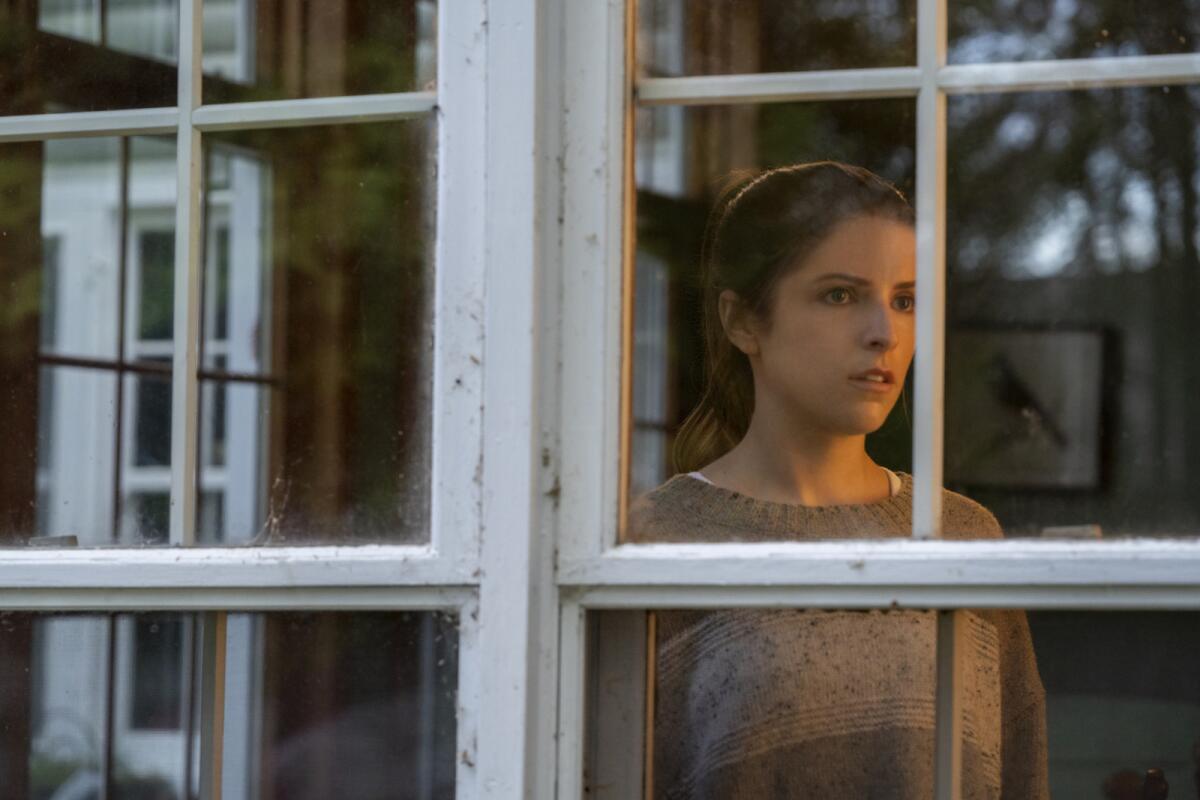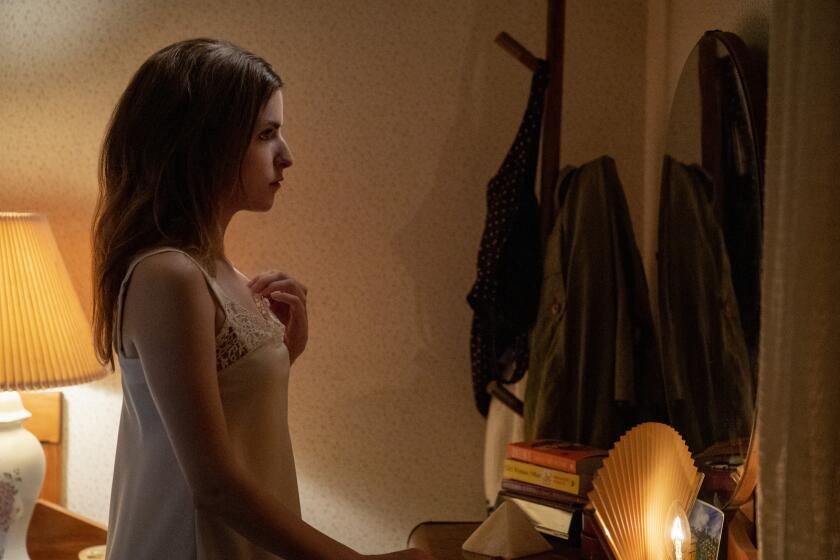Review: Anna Kendrick explores codependent damage in ‘Alice, Darling’

- Share via
In “Alice, Darling,” the titular protagonist’s friends are a little worried. As the three of them embark on a weeklong trip, peacemaking Sophie (Wunmi Mosaku) has her eye on Alice (Anna Kendrick), later describing her eating habits as “disordered.” Birthday girl Tess (Kaniehtiio Horn), a struggling artist, has been drifting apart from Alice. In the eyes of her friends, Alice’s personality has started to fade. What they don’t know is she’s frequently on the verge of a panic attack and can be set off by the mere thought of displeasing boyfriend Simon (Charlie Carrick).
She and Simon are in an unhealthy, codependent relationship characterized by him controlling her with frequent check-ins and the threat of disapproval. We don’t delve into the details. We do know any abuse is emotional rather than physical, often in the form of withering criticism from an older (by about eight years), successful man on the high end of an imbalanced relationship dynamic. Beyond that, Simon simply comes across as a needy, possessive-obsessive jerk. The movie doesn’t try to explain more deeply than that, answering the inevitable questions by having Alice overhear strangers incredulously wondering about a girl in a harmful circumstance: “Why would she put herself in that situation?” You see in her eyes: They wouldn’t understand. But I do.
For your safety
The Times is committed to reviewing theatrical film releases during the COVID-19 pandemic. Because moviegoing carries risks during this time, we remind readers to follow health and safety guidelines as outlined by the CDC and local health officials.
The film doesn’t trace who Alice used to be or how she got here. It skips every opportunity to show us, or to let us hear her tell her side (it even skips the scene where she does so for her friends); it’s deliberately vague in a way that is dramatically unhelpful. But then, it’s less about that relationship than the possibility of her recovery beginning. The girls’ trip turns into a kind of unintended intervention, even a detox, especially once she’s deprived of her phone and forced to go cold turkey.
Threaded through is a subplot of a local girl gone missing; it’s a metaphor for Alice on multiple levels. What part or parts of her have disappeared, has she suppressed or lost, in service of her toxic relationship? Seeing the townspeople gathered in search parties likely reminds her there are people who want to help her. She identifies with the lost girl.
In ‘Alice, Darling,’ the actor and producer drew on her own emotionally abusive relationship to render the experience with remarkable fidelity.
At the same time, actor identifies with role: Kendrick has been candid about what the story means to her personally, saying she had emerged from an experience not unlike Alice’s not long before the script came to her. Her performance convincingly conveys the symptoms; her shortness of breath, subtle shrinking, facial fragility all ring true. As her friends, Mosaku and Horn have distinct personalities and relationships; one senses a history among the three, without which the whole enterprise would sink.
First-time director Mary Nighy (daughter of storied actor Bill) spends time with her characters, letting those dynamics emerge. She lets the camera drink in the differences between their big-city home environs and the placidity of their woody, lakeside getaway. Despite the change in locale, of course, the rot persists: Even in this idyll, there’s the specter of the missing girl, just as beneath the happy front Alice presents, supports are giving way. The proceedings can feel heavy, as can the metaphors — hopefully this and “Nanny” will back filmmakers off symbolic water for a while — but Nighy gets the most important part, the relationships, right.
“Alice, Darling” may be harmed in the public sphere by a disingenuous promotional campaign touting it as a “taut thriller” and threatening “shattering vengeance” by the boyfriend. Apart from one sequence tied to the missing girl and the persistent stress of witnessing how damaged Alice is, the actual experience of the film is not characterized by “thriller” elements. This isn’t “Enough” or “Sleeping With the Enemy” and shouldn’t be sold as such. “Alice, Darling” is a slow-developing drama about a woman traumatized by an abusive, codependent relationship. Ultimately, it’s about the bonds of sisterhood and how those who know you best and love you most can help you heal, or at least start you on that path. Its vagueness serves almost as a Rorschach test. How effective it is as a drama may depend on your perspective.
'Alice, Darling'
Rated: R for language and some sexual content
Running time: 1 hour, 30 minutes
Playing: Exclusive one-week theatrical engagement at the AMC Sunset 5 in West Hollywood beginning Dec. 30 before a theatrical run at AMC theaters Jan. 20.
More to Read
Only good movies
Get the Indie Focus newsletter, Mark Olsen's weekly guide to the world of cinema.
You may occasionally receive promotional content from the Los Angeles Times.












